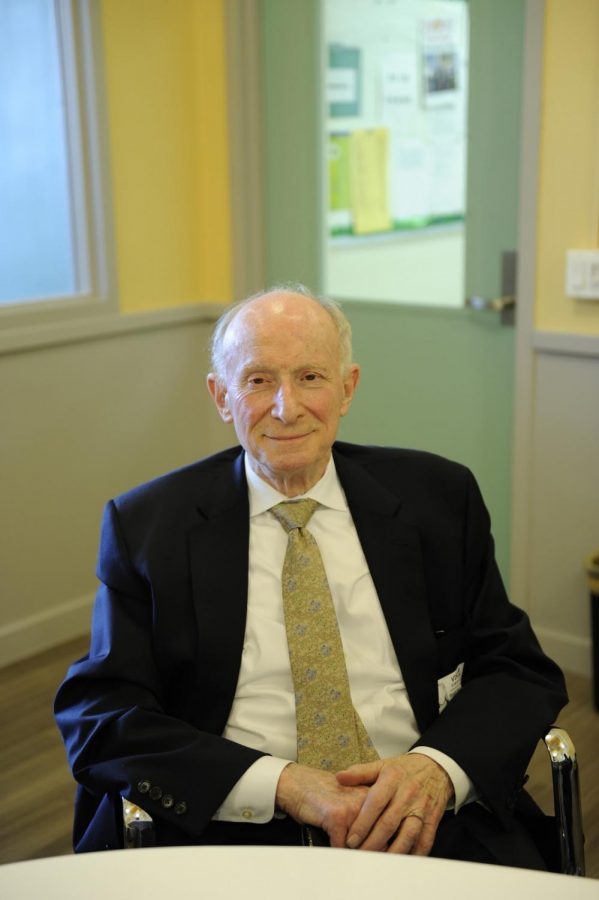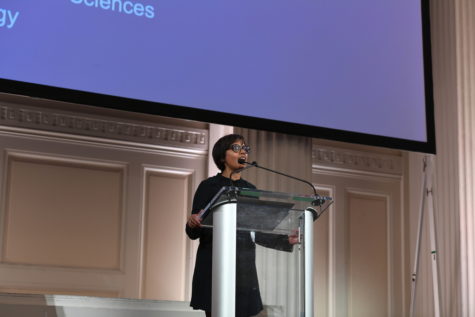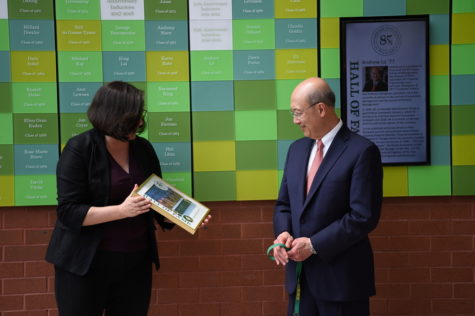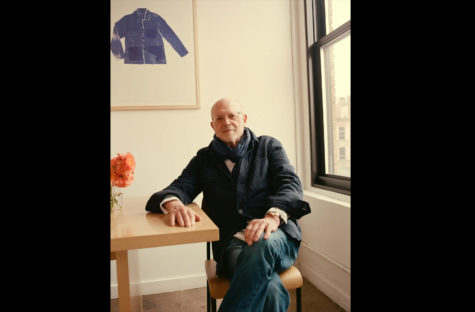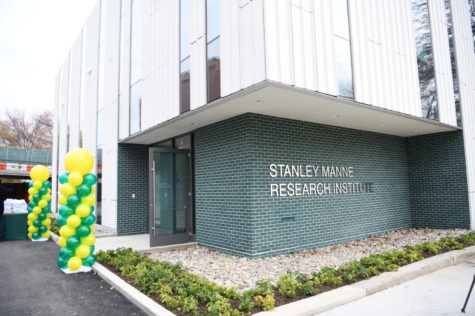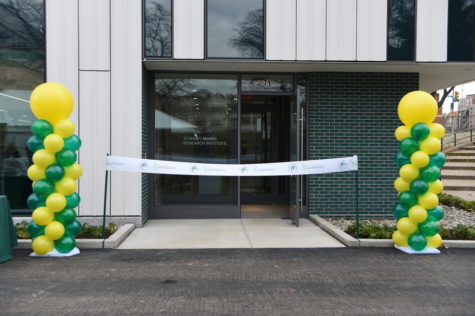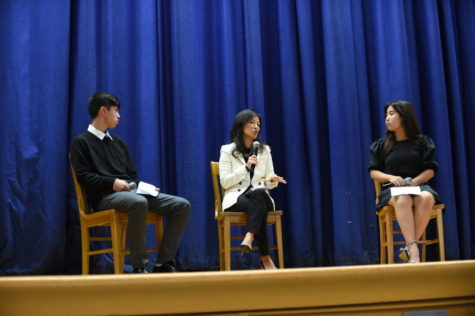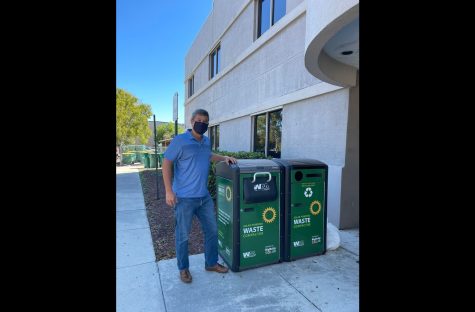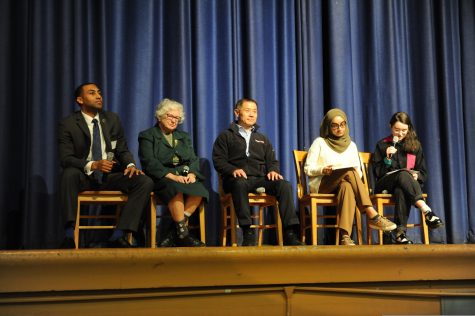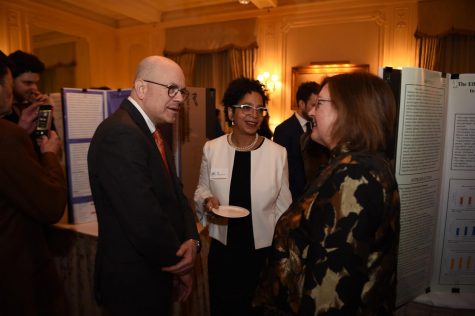Stuart Rice ’49
Award-Winning Quantum Chemist Returns to Bronx Science
Stuart Rice is interviewed in the Alumni Foundation office for The Science Survey.
Stuart Rice is world renowned scientist, best known for his theoretical and experimental research in chemistry. He attended The Bronx High School of Science and graduated in 1949, followed by an undergraduate degree from Brooklyn College in 1952, and a Ph.D. and Master’s from Harvard University. He has written four books and has published over 700 scientific articles. He has taught at the University of Chicago for sixty-one years. On December 8, 2017, Rice returned to Bronx Science to be inducted into the alumni Hall of Fame.
Rice’s scientific inquiry began much earlier than his time at Bronx Science. Growing up during the ’30s and ’40s, Rice said there were fewer restrictions on what he had access to, scientifically. “For example, I could and I did go to downtown Manhattan and I could buy anything. I could buy any chemical at all. Nowadays that would be totally impossible to do, and I had quite a supply of things which are prohibited,” said Rice.
He also mentions that simple household appliances fostered his scientific inquiries in chemistry. “Many household objects were mechanical as opposed to electronic, and they lent themselves both to being taken apart and put back together. So if you had any inclination along those lines, it was easy to develop a kind of interest in how things work,” said Rice. He compares this to a modern day appliance, the outlet, saying that even an outlet is more difficult to take apart and put together today because it is fused.
Moreover, he also attributes some of his early interest in science to his father, who was an engineer, and to World War II. During World War II, when Rice was between the ages of nine and thirteen, there was more emphasis on science and technology — mechanical things and design — within society, influencing Rice’s interests.
Rice is most known for his work in quantum dynamic processes and properties of confinement in liquids and interfaces, yet he did not start out studying these topics. In fact, he began working in molecular biology, specifically on the nucleic acid and its denaturation. This work slowly became appealing to him, in part because of its popularity. “[The molecular biology field] was growing so large and so rapidly, I just didn’t feel as comfortable in such a large group,” Rice noted. “I was always interested in theory and these mechanical things. I must have been the only person in the United States who at that time got the opportunity to continue in molecular biology but drifted in a different direction.”
When asked about his favorite part of his career, Rice explains, “Sometimes you can get a real high on something that is simple because it is satisfying and maybe not the most dramatic thing in the world, and other times you can do things which you think are really important, and it can drop like hunks of lead in the sea.”
He also said that he is satisfied with all of his work on quantum coherence, the structure of liquid metal being the surface, and radiationless transitions. “I’m very fond of the work on the liquid metal surfaces, because it was so much in the teeth of oppositions,” Rice admitted. “People said I was crazy, and that it wouldn’t work; then they did the experiment and suddenly, gee, it’s obvious.”
Rice has won many awards for his work, including the National Medal of Science in Chemistry and the Wolf Award. However, Rice is motivated even without the awards. “If I get an award, which of course recognizes everyone who works with me and not just me, it doesn’t drive me. I’m very pleased, but it’s not something I’m gunning for,” said Rice.
Furthermore, Rice’s years at the University of Chicago are years that he is very proud of. With his experience at both Harvard University and Yale University, as well, Rice believes that the University of Chicago is particularly unique in its broad appreciation for intellect and its welcoming attitude. “I think [the University of Chicago] has a generosity of attitude towards all kinds of intellectual inquiry, which I really found very satisfying,” said Rice.
He attributes some of his success to University of Chicago, saying that if he was working at a different institution, he probably would not have accomplished what he did, because in his group at the University of Chicago, there were many differently concentrated scientists with whom he was able to engage in scientific discourse.
“I was able to pick up on ideas or extend ideas that were floating around in diverse ways, so in that sense, to me anyway, it’s an extraordinary stimulating and diverse atmosphere,” said Rice.
Having been at the university for such a long time, Rice has certainly seen the university grow— literally. He says that when he first arrived at the university there were only 2,000 undergraduates— now there are about 5,500. However, he said that the core of the university’s ideas on education have not changed.
Rice is also very appreciative of the students with whom he has gotten to work. Now being retired, he works entirely with undergraduates. “The quality of students that I’ve worked with has really been a gift, many of whom have become lifelong friends and are now spread not just all over the country, but all over the world. It really is quite a privilege to work with them. They really are wonderful people,” said Rice.
With his undergraduates now, he said, “Most of what I’ve been working on with them has to do with the properties of confined liquids; if you confine a liquid to less than three dimensions, then you know the properties are changed, and we use colloid suspensions for studying this.”
From all of his years working at a university and from all his years working in science, Rice has very valuable advice concerning both. “There is a lot of angst about which college to go to and a lot of misinterpretation of the value of public name versus quality of education,” he said. “The point is make the best out of where you are going because there are so many places in which you can get an outstanding education, which depends only upon your willingness to apply yourself and that you should not live a disappointed life because whatever list you made originally was not fulfilled. There’s just lots and lots of places where you can get a great education.”
In terms of a career, he said that one should follow his or her passions but there is no absolutely correct way to identify a correct path to follow. “The only advice I would give is if you want to be a scientist, is yes, do it,” said Rice.
From his time at Bronx Science, Rice says that his favorite subjects were chemistry and physics. One of his most memorable experiences at Bronx Science was a senior tradition where seniors wore “wacky hats” on which they built different contraptions and apparati. He says, “I remember [my hat] was very heavy and would tend to fall off. I believe it was some sort of clockwork that I built, but I can’t remember specifically.”
He also notes having fun being on the chemistry squad and being suprised by how warm the pool water was when he had to take the then mandated swimming test. But most importantly, he remembers, “I’ve been in many other environments and even when I was a junior fellow at Harvard which is a very select group, I would say that as far as I was concerned, the smartest group of people that I ever coexisted with was my class at Bronx Science.”
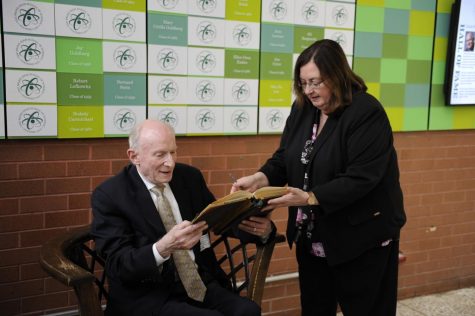
Dr. Donahue presents Stuart Rice with the alumni hall of fame book for him to sign.
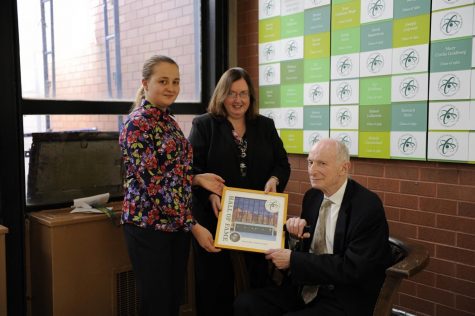
Stuart Rice gladly receives a hall of fame induction gift from Vera Zarubin ’18 and Dr. Donahue.
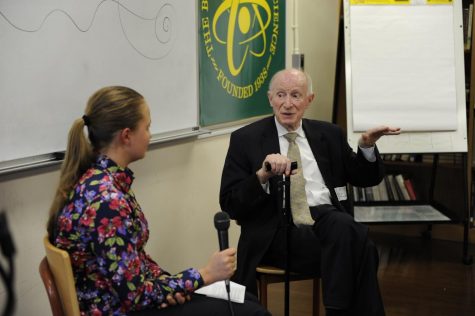
Stuart Rice is interviewed by Vera Zarubin ’18 in front of a group of eager students and budding scientists.
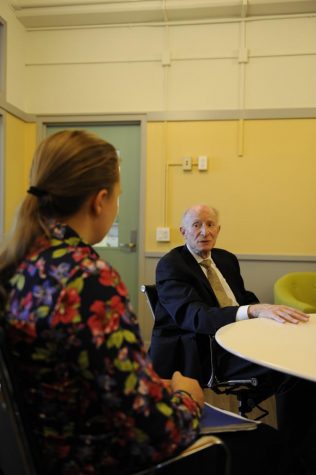
Vera Zarubin ’18 and Stuart Rice discuss both Bronx Science research programs and Rice’s research.
Alexa Asch is in her third year of journalism and is a Managing Editor/ Copy Chief for ‘The Science Survey,’ and a Groups Reporter for ‘The Observatory.’...
Alexis Pan is a Chief Photographer and Photography Editor for ‘The Science Survey’ and ‘The Observatory.’ Alexis’ mother inspired Alexis to begin...

